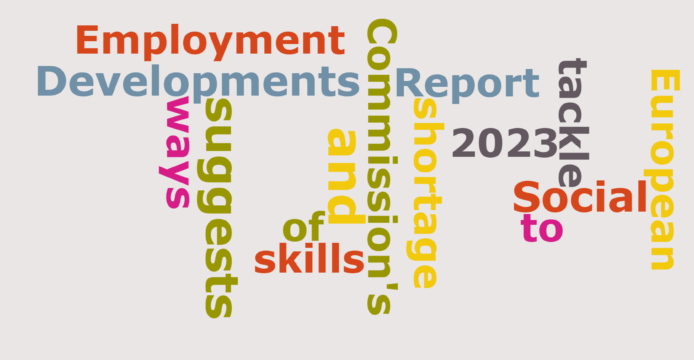According to the European Commission’s latest (July 2023) Employment and Social Developments Report (ESDE), EU labour markets have demonstrated remarkable resilience in 2022. The EU economy grew by 3.5% in real terms in 2022. Employment rates were at a record high at 74.6% with 213.7 million people employed in 2022, and unemployment rates at a historic low at 6.2%. Youth unemployment fell from 16.7% in 2021 to 14.5% in 2022, but remains a major challenge. In addition, companies face labour shortages and there is the need for both employers and workers to adapt to evolving skill needs, in the context of the green and digital transitions.
The ESDE Report estimates that these labour shortages that exist in various sectors and occupations across all skills level are set to increase. They are in fact expected to persist in both high skills and low skills occupations, driven by the creation of new jobs and the need to replace workers who retire. Sectors such as construction, healthcare, and STEM (science, technology, engineering, and mathematics), particularly ICT (Information and Communications Technology), were among the most affected in 2022. These shortages will likely increase with the projected decline in the working age population from 265 million in 2022 to 258 million by 2030.
Labour shortages in some occupations might also be exacerbated by evolving skills and employment needs due to the necessary green transition. Employment growth is expected in some sectors/occupations that are already experiencing labour shortages (e.g., transportation and storage, building, electrical and electronic trades), or are likely to do so in the future (e.g., net-zero technologies, water supply, waste management and certain science and engineering professions).
In the context of the green transition, the investment needs for retraining, reskilling and upskilling in manufacturing of strategic net-zero technologies are estimated between €1.7 billion and €4.1 billion up to 2030. As regards the digital transition, the report finds it contributes to persistent labour shortages among ICT professionals.
The ESDE 2023 report also looks at possible policy measures to tackle labour shortages and bridge skills gaps. These include:
- Investing in adult learning and skills development and training programmes, as well as better job matching with people’s education, experience, and skills. To support Member States, the EU budget and NextGenerationEU provide €64.8 billion for skills measures.
- Removing barriers to entering the workforce, such as providing accessible, affordable, high-quality early childhood education and care.
- Addressing the gender employment gap and boosting labour market participation of young people, older people, people with a migrant background, and people with lower educational attainment to tackle labour shortages.
- Improving working conditions and pay in certain jobs to attract and retain workers.
- Improving the financial incentives for work, such as reviewing taxes and benefits systems targeting low-income earners, and promoting active inclusion to support the labour market participation of those who can work, for instance also through inclusive education and training and individualised support.
- Promoting targeted labour migration from non-EU countries to reduce labour shortages in specific skills groups.
- Enhancing social dialogue and involving social partners in training, improving working conditions, and facilitating adult learning opportunities.

